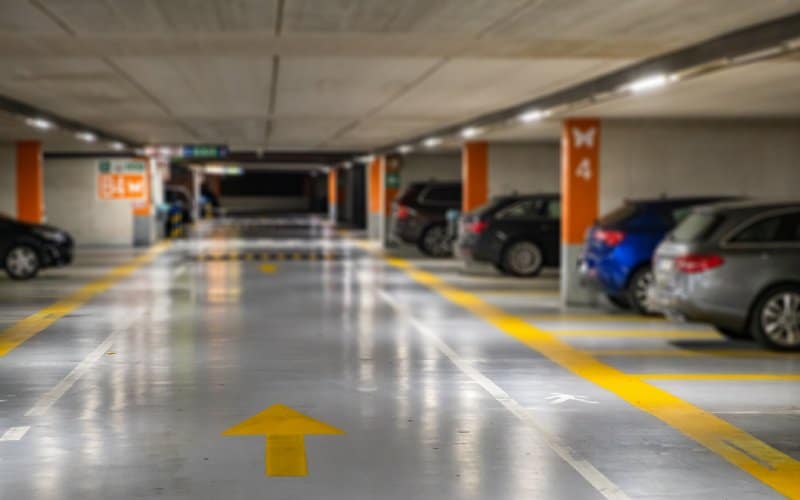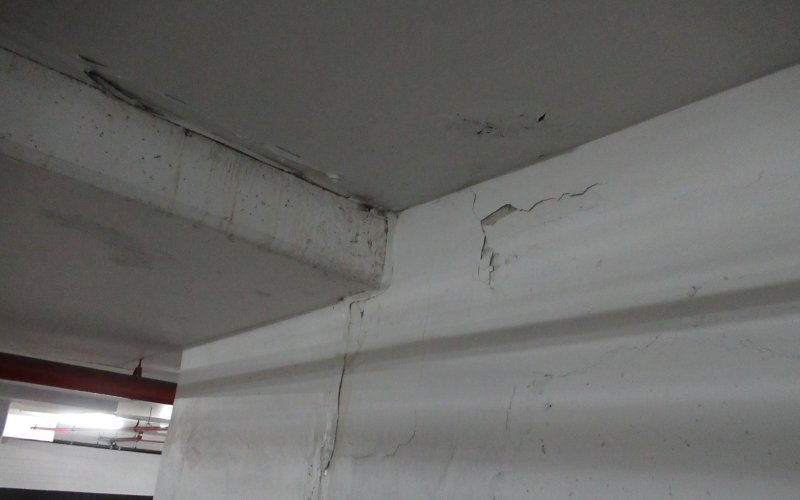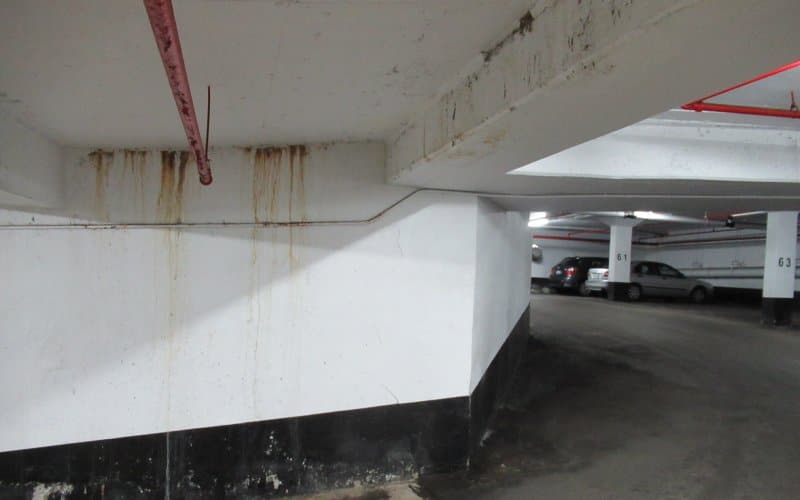500 Hood Road, Suite 320Markham ONL3R 9Z3

Waterproofing plays an essential role in maintaining the structural integrity of parking garages. Water and moisture damage is expensive, and creates significant safety issues. An underground parking garage is particularly at risk, since it faces potential leaks and seepage from multiple sides. However, during inspections, maintenance, and repairs, this critical element can often be overlooked, resulting in potential legal and financial liability issues especially considering many are under large commercial or multi-unit residential buildings.
Waterproofing is needed to protect the levels below and prevent moisture damage in concrete slabs and other materials. Failure to do so will create larger issues, flooding, and leaks that will need major parking garage repairs. What's more, any water damage creates opportunities for even more water to enter, creating a vicious cycle.

Waterproofing during repairs is as critical to include as it is when the underground parking lot was built, but often is neglected or not considered. Waterproofing systems degrade and break down over time, aren't as effective as newer technologies, or may even have not been applied properly, leaving parking garages vulnerable. Damage to structural integrity and collapse can happen if the risks of moisture damage are not addressed.
Some waterproofing systems aren't suitable for use during repairs and restorations, and may need to be completely removed and redone to be effective.
Water is a leading cause of damage to parking garages, and can create significant issues for an underground parking garage.
As the original waterproofing layers age and deteriorate, leaks and moisture damage occurs. A waterproofing membrane can become damaged or de-bonded, at which point, your underground parking garage is vulnerable to water and contaminant infiltration.
Chloride contamination, caused by salts in the water seeping through the concrete, can reach the reinforcing steel in a slab. Deicing salts are common culprits for this. The chloride can then corrode the steel reinforcements. As the steel corrodes, it is weakened, but it also expands, cracking the concrete and causing concrete delamination.
Carbonation contamination can also occur when garage slabs are exposed to carbon dioxide reacting with moisture in the concrete. This forms calcium carbonate, and lowers the concrete's pH levels. Carbonation contamination will detach a waterproof layer, and lead to concrete delamination and corrosion of reinforcing bars.
The bottom-level, built on the ground slab-on-grade surface doesn't need waterproofing as much, since they are the most protected, although they can still experience moisture-related issues. The top slabs, known as roof or deck slabs, are more exposed and vulnerable, so need waterproofing. For multiple underground levels with suspended slabs, reinforcement and waterproofing is needed to protect the levels below. Waterproofing of reinforcement materials to prevent failure is critical.
Certain materials and elements in an underground parking garage need extra-special attention when inspecting or considering for repair, since they are either highly critical for safety, such as columns, beams or other load-bearing elements, or because they are more vulnerable to leaks, such as expansion joints, because of their movement.
The specific water management components, or waterproofing membranes and other moisture control methods will depend on the parking garage materials used. Concrete often has an elastomeric waterproofing membrane adhered to it, while asphalt often relies on mastic waterproofing systems.
Drains are needed in strategic places to avoid pooling; regular inspections, as well as post-repair inspections, should ensure these are not blocked.
Single or multi-level parking structures have several essential areas that need to be assessed for waterproofing failure and moisture damage risks.
Restoring delaminated concrete caused by chloride-contaminated water or carbonation contamination will need to be done. Checking for de-bonded waterproofing, and repairing, if possible, or completely replacing throughout, as appropriate, should be done whenever any repairs and restorations are done. It is also more cost-effective to regularly inspect expansion joints and replace them to avoid leakage leading to more costly repairs.
Slab-on-grade surfaces, as the bottom level, are usually reinforced with welded wire mesh and don't require waterproofing. However, they should still be inspected for water pooling and damage. Suspended slabs do have waterproofing membranes to inspect and repair or replace regularly.
Roof deck waterproofing is especially important to assess, as it is exposed to the elements so is more at risk of damage and wear and tear. To fully inspect it, the roof deck overburden, including asphalt tiles, sidewalks, and other surface elements may need to be removed.
Mastic waterproofing, elastomeric waterproofing, or any other coating or membrane applied to an exposed concrete slab surface needs to be checked for debonding.
Because structural columns are so critical, they should be assessed for water damage regularly and during remediation. Expansion joints are common sources of leaks that need to be checked to ensure they are still watertight.
Drains should be strategically placed at low points to eliminate water pooling and assessed for proper grading, and ensuring there are no blockages or other common issues.

Be sure to budget for waterproofing remediation and create repair allowances, so any issues can be corrected early.
Both regular informal inspections and professional assessments should be done. These help you identify deteriorated waterproofing locations, where leaks and water damage is visible. The professional assessments go a step further, and identify any hidden issues, as well as help you in understanding concealed deterioration mechanisms through testing.
ABSI offers engineering services for underground parking rehabilitation services, including assessments using proven testing methods. We identify areas of concern, and prioritize maintenance and repairs, so you can budget ahead and get critical work completed early to prevent more serious issues and costly repairs.

Naji Hassan, a renowned professional in Building Science and Engineering, brings a wealth of knowledge and experience to his field. Educated at Beirut Arab University and Harvard Business School Online, Hassan has honed his expertise in structural and municipal engineering, building science, and business management. As the President of Accent Building Sciences and an experienced Senior Project Manager, he has made significant strides in building envelope engineering, building condition assessments, and energy retrofit programs. His commitment to innovation and excellence is evident in his approach to large-scale project management and his active participation in industry organizations. Hassan is not only a leader in his field but also a prolific writer and thought leader. He regularly shares his insights and experiences through articles on LinkedIn, which can be found at LinkedIn Articles. Additionally, he maintains a blog where he delves deeper into various aspects of building science, accessible at Accent Building Sciences Blog. Outside of his professional pursuits, Hassan enjoys travel, golf, languages, gardening, and music, reflecting his diverse interests and well-rounded character. Naji Hassan's journey in building science and engineering is not just a career but a testament to his lifelong dedication to learning, teaching, and inspiring others in his field.

500 Hood Road, Suite 320Markham ONL3R 9Z3